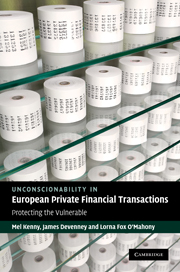Book contents
- Frontmatter
- Contents
- List of contributors
- Introduction: conceptualising unconscionability in Europe
- PART I Conceptualising unconscionability
- 1 Freedom of contract as freedom from unconscionable contracts
- 2 Protection of weaker parties in English law
- 3 Freedom of contract, unequal bargaining power and consumer law on unconscionability
- 4 Loyalty as a tool to combat contractual unfairness: a French perspective
- 5 Unconscionability and the value of choice
- 6 From individual conduct to transactional risk: some relational thoughts about unconscionability and regulation
- 7 An economic perspective on legal remedies for unconscionable contracts
- PART II Conceptualising unconscionability in financial transactions
- Conclusions
- Index
- References
1 - Freedom of contract as freedom from unconscionable contracts
from PART I - Conceptualising unconscionability
Published online by Cambridge University Press: 06 August 2010
- Frontmatter
- Contents
- List of contributors
- Introduction: conceptualising unconscionability in Europe
- PART I Conceptualising unconscionability
- 1 Freedom of contract as freedom from unconscionable contracts
- 2 Protection of weaker parties in English law
- 3 Freedom of contract, unequal bargaining power and consumer law on unconscionability
- 4 Loyalty as a tool to combat contractual unfairness: a French perspective
- 5 Unconscionability and the value of choice
- 6 From individual conduct to transactional risk: some relational thoughts about unconscionability and regulation
- 7 An economic perspective on legal remedies for unconscionable contracts
- PART II Conceptualising unconscionability in financial transactions
- Conclusions
- Index
- References
Summary
Freedom of contract: from the form to the substance
‘Conceptualising unconscionability in Europe’ means also conceptualising the relationship between freedom of contract and protection from unconscionable contracts. Freedom of contract and protection of vulnerable parties in contract law have traditionally been understood as antagonistic, conflicting principles. Legislative rules or doctrines providing remedies against unconscionable contracts are mostly seen as exceptions to the principle of freedom of contract. The high rank of this principle, which relies on the liberty and autonomy of private individuals vis-à-vis public powers, leads to the assumption that exceptions to freedom of contract should possibly be avoided, or, at least, restricted to a minimum.
Scholars who see freedom of contract and weaker party's protection as conflicting principles tend to challenge the predominance of freedom of contract, if they share a concern for social justice in contract law. For example, the Social Justice Manifesto criticised the European Commission's approach according to which in the Common Frame of Reference for a European contract law (CFR) exceptions to freedom of contract could only be admitted if justified by good reasons. The Manifesto raised the provoking question: ‘Why should the principle of freedom of contract have such a privileged position …? Why not reverse the burden of proof so that those who wish to deregulate market transactions should have the burden of explaining the potential advantages to be gained by the parties to these transactions from the absence of mandatory rules?
- Type
- Chapter
- Information
- Unconscionability in European Private Financial TransactionsProtecting the Vulnerable, pp. 7 - 25Publisher: Cambridge University PressPrint publication year: 2010
References
- 1
- Cited by



